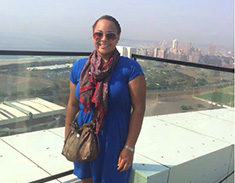
, a political science and African studies double major from Buffalo, N.Y., atop the Moses Mabhida Stadium in Durban.
Editor’s note: In this series, şÚÁĎÍř students share stories about their summer experiences in offices, labs, and open spaces across the world.
This summer, I am in Durban, South Africa, conducting research with Congolese refugees through first-hand communication.
The goal of this project is to give agency to the voices and stories of Congolese refugees — to share, in their own words, the experiences and challenges they face while seeking refuge in South Africa.
This research is especially significant because it follows the most recent wave of xenophobic attacks that occurred in March of this year. Refugees of all nationalities often experience some form of xenophobia. I have been talking to Congolese refugees’ about their sense of belonging, participation, and inclusion in Durban.
Aiding me in my research is the KwaZulu-Natal Refugee Council, where I am interning with Dr. Baruti Amisi. This small community organization advocates for the rights of refugees living in the KwaZulu-Natal province.
I have had the opportunity to sit in on meetings geared toward identifying the roots of xenophobia and ways to promote integration. I have also spoken with many individuals in Durban’s refugee camp (originally one of three but the only that remains open following the attacks) on what government action is needed to safely reintegrate refugees.
My interest in this topic is a culmination of my experience studying social movements with , professor of and , and , assistant professor of , on their extended-study trip to South Africa in the summer of 2014, coupled with the fall of 2014 study abroad program to Durban through the School for International Training.
In the fall, I conducted research on the livelihoods of informal street security guards in one of Durban’s shopping centers. I learned that security is a niche in South Africa filled mostly by Congolese, one of the largest groups seeking refuge. Returning to şÚÁĎÍř, I was still interested in the lives of these individuals, so I applied through the Lampert Institute for a summer research fellowship and received funding.
By the end of this summer, I will have been fortunate enough to spend three-fourths of the academic year in South Africa, all made possible by şÚÁĎÍř.
